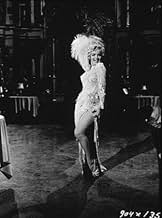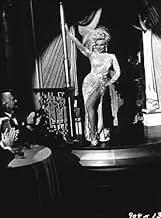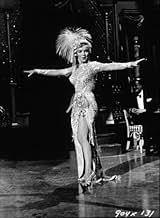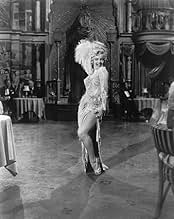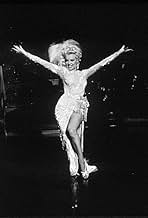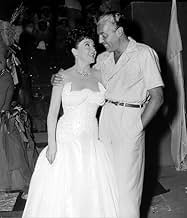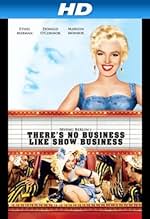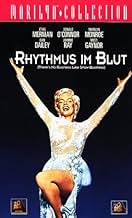IMDb-BEWERTUNG
6,4/10
7054
IHRE BEWERTUNG
Füge eine Handlung in deiner Sprache hinzuMolly and Terry Donahue, plus their three children, are The Five Donahues. Son Tim meets hat-check girl Vicky and the family act begins to fall apart.Molly and Terry Donahue, plus their three children, are The Five Donahues. Son Tim meets hat-check girl Vicky and the family act begins to fall apart.Molly and Terry Donahue, plus their three children, are The Five Donahues. Son Tim meets hat-check girl Vicky and the family act begins to fall apart.
- Regie
- Drehbuch
- Hauptbesetzung
- Für 3 Oscars nominiert
- 4 Nominierungen insgesamt
Dorothy Abbott
- Showgirl
- (Nicht genannt)
Dorothy Adams
- Nurse
- (Nicht genannt)
Robert Adler
- Night Watchman
- (Nicht genannt)
Aladdin
- Orchestra Violinist
- (Nicht genannt)
Fred Aldrich
- Private Detective
- (Nicht genannt)
Empfohlene Bewertungen
When Darryl F. Zanuck virtually forced exhibitors and most of his fellow studio mogul rivals to adopt CinemaScope as a panacea for TV's devastation of Hollywood's weekly box office bonanza, he dictated that virtually all of Twentieth's output was to be filmed in that eye-stretching process. "There's No Business Like Show Business," directed by that old pro, Walter Lang, seems to be the prime example of Darryl's minions saying to their boss: "You want wide? We'll give you W-I-D-E!!"
Everything about it was designed and lensed to emphasize the original ratio of the CinemaScope process and viewing it on a video that isn't letterboxed must look like what a one-eyed person must experience in everyday life. I never did see it in a theater but I have seen it on a TV broadcast which more-or-less recreated its widescreen ratio. It's a glorious mish-mash. Every Berlin tune that could be stuffed into it is given at least one run-through; John de Cuir's production design must have occupied every inch of several of Twentieth's West Los Angeles soundstages; Ethel Merman, after her terrific movie repeat of her Broadway success in "Call Me Madam" for Fox (and now, as of 2005, available on video), trumpets away in number after number (Must have been an ear-rending experience over those original four-track stereophonic sound systems.); Dan Dailey, Donald O'Connor and Mitzi Gaynor give it their energetic best; and then there's Marilyn. What can we say, with all that so sadly, in her personal life, came after she reluctantly fulfilled her contractual obligation in this one? She dazzles in, let's face it, a rather vulgar way, and seems shoehorned in to boost the potential box office. And they even added Johnnie Ray, a huge jukebox success at the time (and, due to his hearing deficiency, performing his songs at an even greater volume than La Merman.)
All in all this one shouldn't be missed if you want to view an example of Hollywood at its brassiest, in a production fairly bulging with elements that may not coalesce very harmoniously but which was, no doubt, worth the price of admission to those movie palaces before they were carved up to become the precursors of today's sterile multiplexes.
Everything about it was designed and lensed to emphasize the original ratio of the CinemaScope process and viewing it on a video that isn't letterboxed must look like what a one-eyed person must experience in everyday life. I never did see it in a theater but I have seen it on a TV broadcast which more-or-less recreated its widescreen ratio. It's a glorious mish-mash. Every Berlin tune that could be stuffed into it is given at least one run-through; John de Cuir's production design must have occupied every inch of several of Twentieth's West Los Angeles soundstages; Ethel Merman, after her terrific movie repeat of her Broadway success in "Call Me Madam" for Fox (and now, as of 2005, available on video), trumpets away in number after number (Must have been an ear-rending experience over those original four-track stereophonic sound systems.); Dan Dailey, Donald O'Connor and Mitzi Gaynor give it their energetic best; and then there's Marilyn. What can we say, with all that so sadly, in her personal life, came after she reluctantly fulfilled her contractual obligation in this one? She dazzles in, let's face it, a rather vulgar way, and seems shoehorned in to boost the potential box office. And they even added Johnnie Ray, a huge jukebox success at the time (and, due to his hearing deficiency, performing his songs at an even greater volume than La Merman.)
All in all this one shouldn't be missed if you want to view an example of Hollywood at its brassiest, in a production fairly bulging with elements that may not coalesce very harmoniously but which was, no doubt, worth the price of admission to those movie palaces before they were carved up to become the precursors of today's sterile multiplexes.
This CinemaScope musical follows the lives and loves of the Donahues, a family of vaudeville performers: father Terrance (Dan Dailey), mother Molly (Ethel Merman), elder son Tim (Donald O'Connor), daughter Katy (Mitzi Gaynor), and younger son Steve (Johnnie Ray). They persevere through changing tastes, the stock market crash, and the start of WW2. Tim falls for co-star Vicky (Marilyn Monroe), while Katy finds romance with writer Charles (Hugh O'Brian), and Steve pursues a different calling.
The threadbare story merely serves to connect a series of elaborate musical numbers designed to make the best of the new widescreen CinemaScope format. Director Lang and choreographer Robert Alton turn in some excellent work, and Donald O'Connor reportedly called this his favorite of his films (over Singin' in the Rain?!?). I watched this for Monroe, who doesn't impress much here. She supposedly didn't want to appear in this, but did so in order to win the lead in The Seven Year Itch. This was one of Fox's most expensive productions to date, and despite selling a lot of tickets, it ended up being a money-loser. It earned Oscar nominations for (inexplicably) Best Story (Lamar Trotti), Best Score (Alfred & Lionel Newman), and Best Color Costumes (Charles Le Maire, Miles White, Travilla).
The threadbare story merely serves to connect a series of elaborate musical numbers designed to make the best of the new widescreen CinemaScope format. Director Lang and choreographer Robert Alton turn in some excellent work, and Donald O'Connor reportedly called this his favorite of his films (over Singin' in the Rain?!?). I watched this for Monroe, who doesn't impress much here. She supposedly didn't want to appear in this, but did so in order to win the lead in The Seven Year Itch. This was one of Fox's most expensive productions to date, and despite selling a lot of tickets, it ended up being a money-loser. It earned Oscar nominations for (inexplicably) Best Story (Lamar Trotti), Best Score (Alfred & Lionel Newman), and Best Color Costumes (Charles Le Maire, Miles White, Travilla).
Two scenes surprise, both with Marilyn Monroe: her singing of the "After You Get What You Want..." number in a ultra-tight, combination flesh-colored/white gown. It's obvious that the image portrayed is that she could be nude, with the frilly white covering her talents. The second is the famous "Heat Wave" number, in a skimpy outfit, with her navel appropriately covered, yet below is a flesh-colored "window" for more erotic symbolism. In 1954 nudity could NOT be shown, but those scenes probably BARELY squeaked by the censors. The film depicts the traveling, singing/dancing Donahue Family, headed by brassy Ethel Merman and Dan Dailey, with sons Donald O'Connor, Johnnie Ray (who wants to be a priest), and daughter Mitzi Gaynor. It's obvious the Monroe character was an afterthought to boost the film's success; the actress really didn't want to do the part, the studio allegedly counteracted by upping her salary and promising her the lead in "The Seven Year Itch" (1955). Nevertheless, Monroe looks great and is unforgettable, comedically, dramatically and musically. O'Connor is great fun and Gaynor is a knockout dancer. Between some slow stages, musical numbers are expertly staged, with magnificent sets and superb color schemes all throughout. The finale is surprisingly touching with a rousing title tune reprise by all; only way to watch this is on the pristine-restored widescreem (2:55 to 1) DVD.
20th Century Fox was no match for MGM when it came to musicals. Daryl F. Zanuk decided to gamble with this film where the talents of a Broadway star, Ethel Merman, would be showcased. Ms. Merman in spite of being the toast of Broadway, never made it big in Hollywood. After all, she was not a radiant beauty, but oh, could she belt a song that could be heard at the top of the balcony! Phoebe and Henry Ephron were brought on board to write the screen treatment and Walter Lang directed.
The musical was also blessed in that Irving Berlin's music is heard throughout in all its glory. Ms. Merman was the perfect actress to interpret the songs written by Mr. Berlin. They made a perfect duo, even though, for some viewers not used to Ethel Merman's singing style, it might prove an uneasy combination.
The story is simple enough. It follows the Donahues from the early days of vaudeville through some glittering years after. Molly and Terence Donahue had two sons, Tim and Steve, and a daughter, Katy. As the children grow up, the parents' popularity began to recede. The film deals with Tim, as a young man, as he falls for Vicky Parker, a beautiful singer who makes it big on her own. Vickie, who is more interested in her own career neglects Tim. As a result, Tim goes on his own to find himself, away from his family and Vickie.
The best thing in the film is Ethel Merman. She was a legendary figure and as Molly Donahue, she is at her best. Dan Dailey was the perfect partner for Ms. Merman. Donald O'Connor is also seen doing some fine dancing. Marilyn Monroe was a lovely woman to look at. As a singer, she had a small voice, but she used it well making the songs her own. Mitzi Gaynor plays Katy. Johnnie Ray, a popular singer of that period is terribly miscast. His Steve is the worst thing in the movie.
Although predictable, this film has some great things going for it. Some of the musical numbers are well staged and will not disappoint. On the whole as the camaraderie expressed by the title of the film is evident in the musical.
The musical was also blessed in that Irving Berlin's music is heard throughout in all its glory. Ms. Merman was the perfect actress to interpret the songs written by Mr. Berlin. They made a perfect duo, even though, for some viewers not used to Ethel Merman's singing style, it might prove an uneasy combination.
The story is simple enough. It follows the Donahues from the early days of vaudeville through some glittering years after. Molly and Terence Donahue had two sons, Tim and Steve, and a daughter, Katy. As the children grow up, the parents' popularity began to recede. The film deals with Tim, as a young man, as he falls for Vicky Parker, a beautiful singer who makes it big on her own. Vickie, who is more interested in her own career neglects Tim. As a result, Tim goes on his own to find himself, away from his family and Vickie.
The best thing in the film is Ethel Merman. She was a legendary figure and as Molly Donahue, she is at her best. Dan Dailey was the perfect partner for Ms. Merman. Donald O'Connor is also seen doing some fine dancing. Marilyn Monroe was a lovely woman to look at. As a singer, she had a small voice, but she used it well making the songs her own. Mitzi Gaynor plays Katy. Johnnie Ray, a popular singer of that period is terribly miscast. His Steve is the worst thing in the movie.
Although predictable, this film has some great things going for it. Some of the musical numbers are well staged and will not disappoint. On the whole as the camaraderie expressed by the title of the film is evident in the musical.
The film was, perhaps, the splashiest of the year's musicals
It dealt with the joys, loves and heartaches experienced by a vaudeville family called the Donahues (spending their lives singing and dancing and touring) with Merman and Dailey as mother and father, and Ray, Gaynor and O'Connor as their talented offspring
All of them get to perform a large catalog of new and old songs by Irving Berlin in sumptuous arrangements, beautiful settings and on a big Hippodrome extravaganza
Daily and Merman hit the top; O'Connorwho had liked to build a barbed-wire fence around Marilyndid it Scottish and came with some fine dances; Gaynor's love was dancing and she was really cute; and while Ray got some thinking to do, he sells a very beautiful song ("If You Believe").
Marilyn (appearing after 29 minutes screening) was deliciously charming, seducing and very appealing She sang "After You Get What You Want" and "Lazy," and did that tropical version of 'Heat Wave.'
All of them get to perform a large catalog of new and old songs by Irving Berlin in sumptuous arrangements, beautiful settings and on a big Hippodrome extravaganza
Daily and Merman hit the top; O'Connorwho had liked to build a barbed-wire fence around Marilyndid it Scottish and came with some fine dances; Gaynor's love was dancing and she was really cute; and while Ray got some thinking to do, he sells a very beautiful song ("If You Believe").
Marilyn (appearing after 29 minutes screening) was deliciously charming, seducing and very appealing She sang "After You Get What You Want" and "Lazy," and did that tropical version of 'Heat Wave.'
Wusstest du schon
- WissenswertesOne day, Marilyn Monroe's husband, Joe DiMaggio, visited the set. He refused to be photographed with Monroe, but insisted on being photographed with Ethel Merman, whom he called "my favorite star."
- PatzerDuring the "Heat Wave" number, Marilyn Monroe accidentally pokes her finger in the eye of a dancer standing between the branches of a prop tree.
- Zitate
Molly Donahue: "Don't worry." Hmm. That's a laugh. You start worrying about your kids the day they're born and you never stop. Even after they bury you, I bet you never stop.
- VerbindungenFeatured in Die Welt der Marilyn Monroe (1963)
- SoundtracksWhen the Midnight Choo-Choo Leaves for Alabam'
(uncredited)
Written by Irving Berlin
Performed by Ethel Merman and Dan Dailey
Later performed by Mitzi Gaynor and Donald O'Connor
Top-Auswahl
Melde dich zum Bewerten an und greife auf die Watchlist für personalisierte Empfehlungen zu.
- How long is There's No Business Like Show Business?Powered by Alexa
Details
- Erscheinungsdatum
- Herkunftsland
- Sprachen
- Auch bekannt als
- El mundo de la fantasía
- Drehorte
- Produktionsfirma
- Weitere beteiligte Unternehmen bei IMDbPro anzeigen
Box Office
- Weltweiter Bruttoertrag
- 6.341 $
- Laufzeit1 Stunde 57 Minuten
- Farbe
- Seitenverhältnis
- 2.55 : 1
Zu dieser Seite beitragen
Bearbeitung vorschlagen oder fehlenden Inhalt hinzufügen

Oberste Lücke
By what name was Rhythmus im Blut (1954) officially released in India in English?
Antwort


